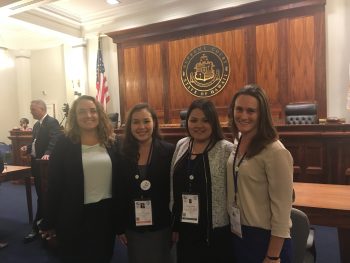
 The Tony Oposa Inter-Generational Climate Justice for the International Court of Justice (“ICJ4ICJ”) Moot Court workshop was convened on Thursday, September 1 at the Hawaii Supreme Court. This workshop addresses the responsibility of nation-states to address the global climate crisis before the benefit of present and future generations. The William S. Richardson School of Law represented the Alliance of Small Island States (“AOSIS”), an intergovernmental organization representing small island states, the areas most susceptible to “disappearing” due to the effects of climate change.
The Tony Oposa Inter-Generational Climate Justice for the International Court of Justice (“ICJ4ICJ”) Moot Court workshop was convened on Thursday, September 1 at the Hawaii Supreme Court. This workshop addresses the responsibility of nation-states to address the global climate crisis before the benefit of present and future generations. The William S. Richardson School of Law represented the Alliance of Small Island States (“AOSIS”), an intergovernmental organization representing small island states, the areas most susceptible to “disappearing” due to the effects of climate change.
Climate justice requires cooperation and solidarity between nations. As a representative of AOSIS, we addressed how principles of customary international law-the duty to cooperate and notify, the duty to do no harm, the precautionary principle, and the polluter pays principle-provide binding obligations on all states. The United Nations’ Convention on the Law of the Sea (UNCLOS), the Paris Agreement, and the United Nations’ Sustainable Development Goals (UN SDGs) represent the obligation of states to address climate change. The law of state responsibility provides enforcement mechanisms for these legal instruments by requiring cessation of intentional wrongful acts and violations of the law, and reparations, and is similarly applicable to climate change issues.
Most times when we speak of “climate change,” we think of greenhouse gas (“GHG”) emissions, rising sea levels, climbing ocean temperatures, coral bleaching, and other hard data. However, communities everywhere will be impacted by climate change. The human cost of global warning can only be rectified through climate justice. As a result of anthropogenic GHG emissions, those in small island states and other vulnerable regions face the threat of irreparable and irreversible losses as their coastal waters produce less, their lands recede, and their statehood and lives loom in the balance. Those most responsible must take the lead and show greatest ambition in their domestic climate actions and support for vulnerable countries.
The ICJ4ICJ Moot Court instilled the lesson that if we want to change the dream of the modern world we must pursue environmental injustices hand in hand with the social justice issues that we are facing. It is about acknowledging our personal responsibility in an interconnected world. It is about acting outside the narrow confines of self-interest – even as it becomes clear that our self-interest can destroy the lives of future generations. The only solutions to climate change are fair solutions that protect human rights and uphold the rule of law.
